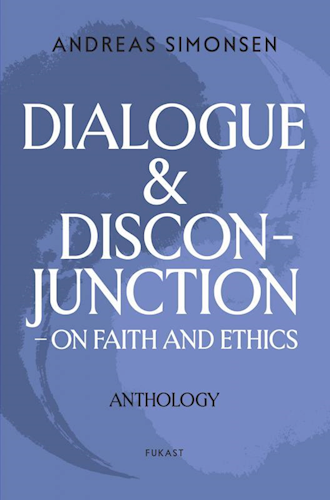Dialogue & Disconjunction
- on faith and ethics
Andreas Simonsen was an ethical thinker, but he did not want to be called a philosopher. He thought that a philosopher was someone who was too remote from reality and that ethical thinking often lacked a basis in everyday life. Simonsen’s quest was to discover an ethics that was realistic; a balance between ethical ideals and a recognition of the complex conditions we live in.
Simonsen felt that humans are at once reflective, thinking, rational beings as well as passionate and sensitive actors. That seems like a contradiction, a paradox which makes it difficult to arrive at ethical guidelines. But for Simonsen these seeming contradictions were actually complementary. Simonsen was inspired by Niels Bohr’s observations in physics in which a phenomenon can appear as both a particle as well as a wave depending on how it is being observed. Bohr used the Taoist yin-yang symbol to illustrate complementarity and both he and Simonsen expanded this understanding to include ethical thinking and the distinctive aspects of human nature.
Of special interest to Simonsen was the relationship between the human need for knowledge on one side – which focuses on causality and an understanding of our condition – and, on the other side, our need to act on the other – which entails will, vision and an understanding that we can influence our lives. This dynamic can be seen nuanced in various ways throughout Simonsen’s writings and it is at the heart of his method.
Disconjunctions
Simonsen investigated other concepts that at the time were considered contradictory aspects and ideals. Over and over, he showed that rather than being opposites they were interdependent and balanced one another. Via the contrary aspects that Simonsen examines – such as body and soul; emotion and intellect; volition and cognition; particular and general; idealism and realism; objectivity and subjectivity; religiosity and humanism – he shows how each side entails dangers if kept separate or not held in conjunction with the other side, if each side isn’t seen as part of a whole. In his early writings Simonsen used Bohr’s concept and called such contradictions complementary. Later, he found this concept inadequate and invented a particular and more precise word, Disconjunction.
Dialogue
Simonsen was particularly inspired by Socrates whom he learned about in his childhood home and during his studies in philology. He was taken both with Socrates’s ethics and with the Socratic method (as known from Plato’s texts), dialogue. For Simonsen it was conversation, not finalized ethical guidelines that was the goal. In order to understand disconjunctions, to find balance between two opposing poles, dialogue and weighting are necessary. Simonsen wrote several of his books as conversations between people with differing ethical attitudes and let them defend their own positions and seek agreement with one another. These dialogical texts show Simonsen’s interest in and ability to seek deep understanding of views that differ from his own.
Faith and ethics
In his thinking about ethics Simonsen had a special interest in the relationship between faith and ethics – more specifically in the disconjunction between them. He investigated whether it is possible to think ethically without an understanding of life as God-given. And, in reverse, whether it is possible to have faith (Jewish or Christian) without believing in a personal God. In this way Simonsen focuses on the intersection of religious and non-religions ethics. This ethical investigation of our relationship with God and to our fellows is central to his thinking.
The anthology
This anthology is being published in celebration of the centenary of Andreas Simonsen’s birth. The anthology is constructed around three sections that focus on concepts in Simonsen’s thinking, Disconjunction & Dialogue; Faith; and Ethics. These concepts cannot be separated in Simonsen’s thinking and life. Still each section’s texts refer to specific issues and give the reader opportunity to delve into different aspects of Simonsen’s process and thinking. The last section in the anthology, Simonsen, the Person, offers the reader insight into his personality. Here a reader encounters Simonsen’s ethical considerations relating to the depressions he suffered and ethical deliberations from his diary and in letters to friends.
The anthology is published by The Foundation for the Dissemination of Knowledge of Andreas Simonsen’s Thinking in the hope that it will provide material for many more conversations about what is ethically good and a recognition of the fact that we need unity among ethical contradictions rather than unity free from contradiction.

You can buy the E-book here
